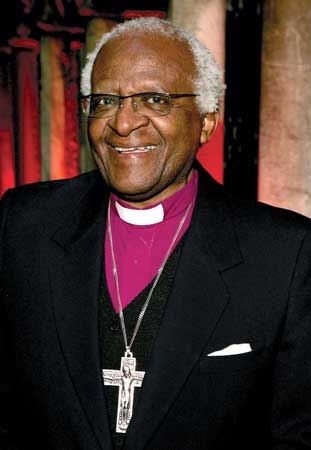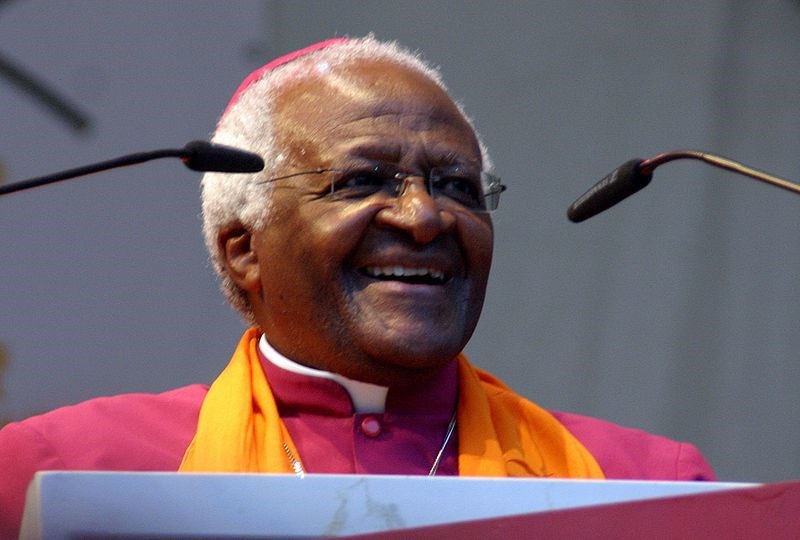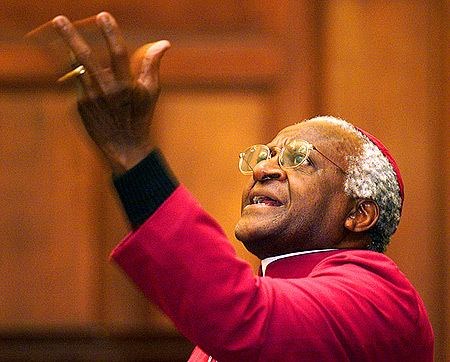The dictionary defines apartheid as: ‘a rigid policy of segregation of the nonwhite population’. Despite humanitarian efforts around the world, this type of segregation was enforced strictly in South Africa until 1994. The government abolished this practice after a powerful, internal uprising and a substantial trade embargo against South Africa promoted by protesters. One of those protesters was Desmond Tutu, one of the most influential and prominent figures during this time. Desmond Tutu is worthy of the title ‘hero’ because he sacrificed his time and energy for the greater good, and continues to do so until this day, after he achieved his goal. He is a brilliant standard for people to emulate.
 |
| (http://outtheotherear.files.wordpress.com/2008/06/tutu.jpg) |
Desmond Mpilo Tutu was born on October 7th, 1931 to Zachariah and Aletta Tutu, in Klerksdorp, South Africa. He grew up there, and there he contracted tuberculosis at the age of fourteen, a deadly disease. He resided in a hospital for twenty months, but made a full recovery. He wanted to be a doctor, but his family could not afford the education, so he pursued a career in teaching instead. In 1957, his ambitions had to be changed yet again, when the government instituted a racially discriminatory education system that did not allow him to fulfill that dream. His final career change occurred when he decided to enter the Angelica Church. He was ordained [to be appointed a priest] in 1961, and then promptly earned his B.A. at the University of South Africa. After a series of lecturing positions he became dean of Johannesburg in 1975, where he first publically challenged white rule. He became bishop of Lesotho just a year later, then the bishop of Johannesburg in 1985. Only 14 months after, the peoples of Johannesburg elected him their archbishop, the first native African to head the Anglican Church in South Africa. In the 1980s, clergymen were the most driving opponents to apartheid and Tutu was no different. Tutu finally achieved his goal in 1994 when apartheid was abolished by the new government.
Desmond Tutu is heroic because he self-sacrificed for the greater good. For example, during his long protests he “…repeatedly risked imprisonment for advocacy of non-violent opposition to apartheid, and for encouraging economic sanctions against South Africa” (Tutu, Desmond (1931- )). He sacrificed his personal comfort and safety to do what is right, for the greater good. He encouraged other countries to stop trading with the country he lived in, he braved the risks of speaking out against the country he lived in, just for the benefit of the less fortunate. Also, the government disapproved of his action, but he went ahead anyway, “Tutu's efforts to end apartheid were met with continued harassment. The South African government took away his passport, a move that often preceded imprisonment. Without his passport, Tutu could leave the country only with the government's permission” (Tutu, Desmond Mpilo). Tutu was impeded by the government for trying to end apartheid, but he ignored them and gave up his rights for the greater good of a free nation. He sacrificed so much for the anti-apartheid effort and he got nothing in return; he is a worthy hero for all he has done for other people.
 |
| (http://upload.wikimedia.org/wikipedia/commons/thumb/e/ed/Desmond_tutu_20070607_1.jpg/800px-Desmond_tutu_20070607_1.jpg) |
Desmond Tutu is a hero because he serves as a model for other people to emulate. For example, when he finally decided to oppose apartheid “He resolved to use his influence and visibility to initiate talks between blacks and the government, and for the next fifteen years he spoke out publicly and forcefully against apartheid” (Tutu, Desmond Mpilo). He followed his own beliefs. He wasn’t a follower of what was common. He fought for what he believed in and didn’t give up; he spoke up against apartheid for fifteen years, but he eventually got it done. He shows people that you should follow your own beliefs and persevere to achieve what you want. Even though he helped free South Africa from apartheid he still “…continues to head South Africa's Truth and Reconciliation Commission, and to advocate for human rights throughout the world.” (Tutu, Desmond (1931- )). Here Tutu shows that he is dedicated to the general welfare of the world. He achieved his original goal, now he is aiming bigger. He illustrates to us that there are people much less fortunate than you and you should be considerate and help them. Desmond Tutu is a virtuous hero who serves as a role model.
 |
| (http://traceyricksfoster.files.wordpress.com/2009/07/tutu.jpg) |
Desmond Tutu is inspirational because of the commitment he shows for his work. He was diagnosed with prostate cancer, but still wanted to continue his work “…Tutu's battle with prostate cancer, and shortly after the presentation he announced plans to undergo several months of cancer treatment in the United States…so he could continue his work throughout the rigorous cancer treatment” (Archbishop Desmond Tutu). Even after being diagnosed with prostate cancer, he desired to continue his work for the people of the world during the cancer treatment. This is amazing because cancer is a very deadly disease, but he still is concerned about his work. The dedication he shows toward his work is sensational. Also, at 79 he still works for the benefit and welfare of all “…to speak against human rights abuses throughout the world, such as those in the African nation of Zimbabwe and the Asian nation of Burma (Myanmar)” (Tutu, Desmond Mpilo). At the tender age of 79 he is still determined to help the world. It is inspiring that such an old man would still want and be able to do all this. The commitment he shows toward his work is unbelievable.
Desmond Tutu is a deserved hero; he has done so much for the greater good, is a great role model for people, and is an inspiration. The world, South Africa especially, would be so different without his immense dedication and influence. He should go down in annals of history as a great humanitarian and one of the renowned protectors of human rights.
Page created on 5/19/2010 12:00:00 AM
Last edited 5/19/2010 12:00:00 AM
